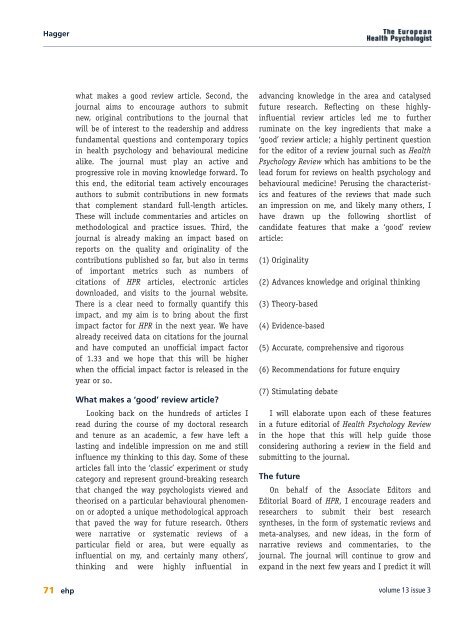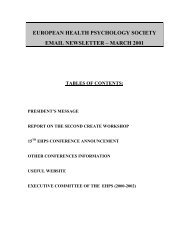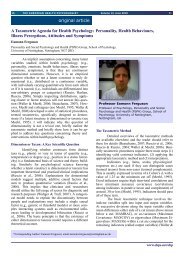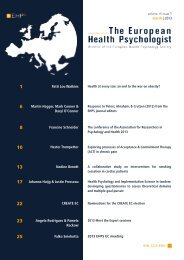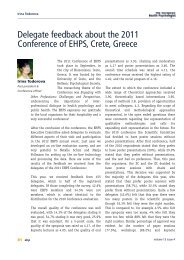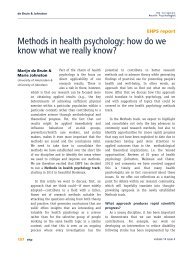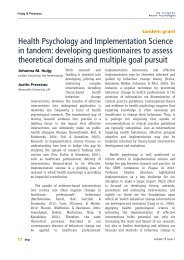PDF download entire issue - European Health Psychology Society
PDF download entire issue - European Health Psychology Society
PDF download entire issue - European Health Psychology Society
Create successful ePaper yourself
Turn your PDF publications into a flip-book with our unique Google optimized e-Paper software.
Hagger<br />
what makes a good review article. Second, the<br />
journal aims to encourage authors to submit<br />
new, original contributions to the journal that<br />
will be of interest to the readership and address<br />
fundamental questions and contemporary topics<br />
in health psychology and behavioural medicine<br />
alike. The journal must play an active and<br />
progressive role in moving knowledge forward. To<br />
this end, the editorial team actively encourages<br />
authors to submit contributions in new formats<br />
that complement standard full-length articles.<br />
These will include commentaries and articles on<br />
methodological and practice <strong>issue</strong>s. Third, the<br />
journal is already making an impact based on<br />
reports on the quality and originality of the<br />
contributions published so far, but also in terms<br />
of important metrics such as numbers of<br />
citations of HPR articles, electronic articles<br />
<strong>download</strong>ed, and visits to the journal website.<br />
There is a clear need to formally quantify this<br />
impact, and my aim is to bring about the first<br />
impact factor for HPR in the next year. We have<br />
already received data on citations for the journal<br />
and have computed an unofficial impact factor<br />
of 1.33 and we hope that this will be higher<br />
when the official impact factor is released in the<br />
year or so.<br />
What makes a ‘good’ review article?<br />
Looking back on the hundreds of articles I<br />
read during the course of my doctoral research<br />
and tenure as an academic, a few have left a<br />
lasting and indelible impression on me and still<br />
influence my thinking to this day. Some of these<br />
articles fall into the ‘classic’ experiment or study<br />
category and represent ground-breaking research<br />
that changed the way psychologists viewed and<br />
theorised on a particular behavioural phenomenon<br />
or adopted a unique methodological approach<br />
that paved the way for future research. Others<br />
were narrative or systematic reviews of a<br />
particular field or area, but were equally as<br />
influential on my, and certainly many others’,<br />
thinking and were highly influential in<br />
advancing knowledge in the area and catalysed<br />
future research. Reflecting on these highlyinfluential<br />
review articles led me to further<br />
ruminate on the key ingredients that make a<br />
‘good’ review article; a highly pertinent question<br />
for the editor of a review journal such as <strong>Health</strong><br />
<strong>Psychology</strong> Review which has ambitions to be the<br />
lead forum for reviews on health psychology and<br />
behavioural medicine! Perusing the characteristics<br />
and features of the reviews that made such<br />
an impression on me, and likely many others, I<br />
have drawn up the following shortlist of<br />
candidate features that make a ‘good’ review<br />
article:<br />
(1) Originality<br />
(2) Advances knowledge and original thinking<br />
(3) Theory-based<br />
(4) Evidence-based<br />
(5) Accurate, comprehensive and rigorous<br />
(6) Recommendations for future enquiry<br />
(7) Stimulating debate<br />
I will elaborate upon each of these features<br />
in a future editorial of <strong>Health</strong> <strong>Psychology</strong> Review<br />
in the hope that this will help guide those<br />
considering authoring a review in the field and<br />
submitting to the journal.<br />
The future<br />
On behalf of the Associate Editors and<br />
Editorial Board of HPR, I encourage readers and<br />
researchers to submit their best research<br />
syntheses, in the form of systematic reviews and<br />
meta-analyses, and new ideas, in the form of<br />
narrative reviews and commentaries, to the<br />
journal. The journal will continue to grow and<br />
expand in the next few years and I predict it will<br />
71 ehp volume 13 <strong>issue</strong> 3


